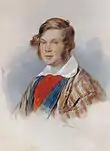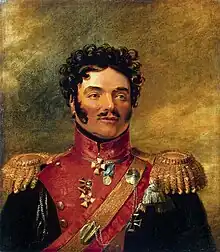Irish Russians
Irish Russians are Russian nationals whose ancestry originates wholly or partly in Ireland. Migration occurred in the context of conflicts in Eastern Europe: the Polish–Muscovite War (1605–18), Ingrian War and Thirty Years' War.
History
The first known Irish people who resided in Russia were part of a company that, during the Polish–Russian War (1605–18), was part of a regiment under the command of Wilim Grim. Later, captain-Rittmeister Jacob Shaw switched sides. In 1614 they left the fortress of Bely to join Russian forces.[1][2] The regiment participated in several Russo-Crimean Wars against the Crimean–Nogai raids.[3][4] In 1626, all foreign mercenaries received Russian names, and after converting to Orthodox Christianity they received material benefits (typically lands with serfs or rubles and clothes).
Notables


- Prince Pyotr Andreyevich Vyazemsky (1792–1878) was a leading personality of the Golden Age of Russian poetry. His parents were a Russian prince of Rurikid stock, Prince Andrey Vyazemsky (1754–1807), and an Irish lady, Jenny Quinn O'Reilly (1762–1802), in baptism Evgenia Ivanovna Vyazemskaya.[5] As a young man, he took part in the Battle of Borodino and other engagements of the Napoleonic Wars. Many years later, Tolstoy's description of the battle in War and Peace appeared inaccurate to him and he engaged in a literary feud with him.
- Count Johann Georg von Browne (1767–1827) was an officer in the Russian army, and settled in Vienna where he was a patron of Ludwig van Beethoven during the composer's early career.[6]
- Yuri Yurievich Browne, Count von Browne in the nobility of the Holy Roman Empire (1698–1792), was an Irish soldier of fortune who became a full general in the Russian military. Browne was descended from a family which could trace its descent to the time of the Conqueror, and had settled in Ireland at a very early period. His immediate ancestors were the Brownes of Camas, Limerick, where he was born 15 June 1698. He was educated at Limerick diocesan school.[6]
- Count Ioseph Kornilovich O'Rourke (1772–1849) was a Russian nobleman. He was a military leader who fought in the Napoleonic Wars and achieved the rank of lieutenant general; he is noted in present-day Serbia, where he led a combined Russian and Serb army to defeat the Turks at Varvarin in 1810.[7]
- Pyotr Petrovich Lassi, Generalfeldmarschall of Russian Imperial Army.[8]
- Alexander Arturovich Rou (also, Rowe, from his Irish father's name) (1906–1973) was a Soviet film director, and People's Artist of the RSFSR (1968). He worked primarily in the fairy-tale genre.
- Alexander Impera
See also
References
- Belsky Chronicle, at Russian National Library, Уваровское собрание, д. 569
- "Belsky Chronicle about The Surrender of Belaya in 1614". Archived from the original on 2017-10-18. Retrieved 2017-10-18.
- A. Fisher, Muscovy and the Black Sea Slave Trade, Canadian-American Slavic Studies
- |Brian L. Davies, "Warfare, State and Society on the Black Sea Steppe 1500–1700", 2007
- Newerkla, Stefan Michael (2020). Das irische Geschlecht O'Reilly und seine Verbindungen zu Österreich und Russland [The Irish O'Reilly family and their connections to Austria and Russia], in: Diachronie – Ethnos – Tradition: Studien zur slawischen Sprachgeschichte [Diachrony – Ethnos – Tradition: Studies in Slavic Language History]. Eds. Jasmina Grković-Major, Natalia B. Korina, Stefan M. Newerkla, Fedor B. Poljakov, Svetlana M. Tolstaja. Brno: Tribun EU, pp. 259–279 (open access), here pp. 272–273.
- Newerkla, Stefan Michael (2019). Die irischen Reichsgrafen von Browne-Camus in russischen und österreichischen Diensten. Vom Vertrag von Limerick (1691) bis zum Tod ihres Hausfreunds Ludwig van Beethoven (1827) [= The Irish counts of Browne-Camus in Russian and Austrian service. From the Treaty of Limerick (1691) to the death of their friend Ludwig van Beethoven (1827)], in: Lazar Fleishman, Stefan Michael Newerkla & Michael Wachtel (eds.), Скрещения судеб. Literarische und kulturelle Beziehungen zwischen Russland und dem Westen. A Festschrift for Fedor B. Poljakov (= Stanford Slavic Studies, Volume 49). Berlin: Peter Lang, pp. 43–68.
- Newerkla, Stefan Michael (2020). Das irische Geschlecht O'Reilly und seine Verbindungen zu Österreich und Russland [The Irish O'Reilly family and their connections to Austria and Russia], in: Diachronie – Ethnos – Tradition: Studien zur slawischen Sprachgeschichte [Diachrony – Ethnos – Tradition: Studies in Slavic Language History]. Eds. Jasmina Grković-Major, Natalia B. Korina, Stefan M. Newerkla, Fedor B. Poljakov, Svetlana M. Tolstaja. Brno: Tribun EU, pp. 259–279 (open access), here pp. 263–265.
- Newerkla, Stefan Michael (2020). Das irische Geschlecht O'Reilly und seine Verbindungen zu Österreich und Russland [The Irish O'Reilly family and their connections to Austria and Russia], in: Diachronie – Ethnos – Tradition: Studien zur slawischen Sprachgeschichte [Diachrony – Ethnos – Tradition: Studies in Slavic Language History]. Eds. Jasmina Grković-Major, Natalia B. Korina, Stefan M. Newerkla, Fedor B. Poljakov, Svetlana M. Tolstaja. Brno: Tribun EU, pp. 259–279 (open access), here pp. 259–261.